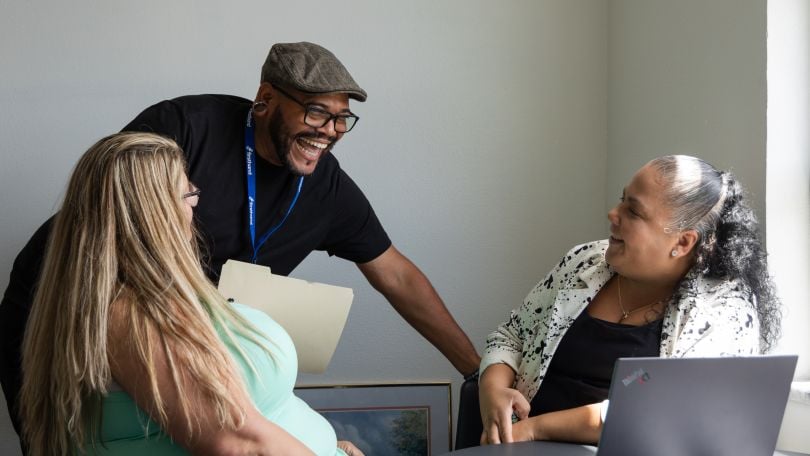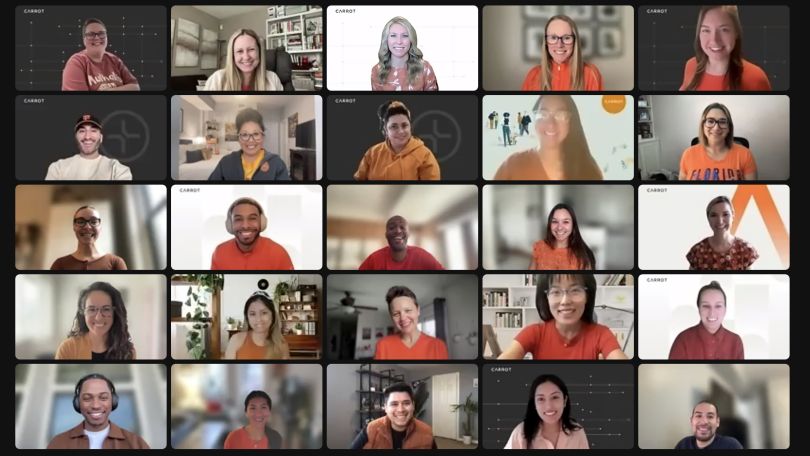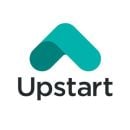It’s easy to take for granted just how remarkable it is that remote work is possible — even logistically.
Logging on for a video conference required 500 cables to be laid along the bottom of the ocean floor in order for that internet to be stable. Accessing that team planning document occurred because of one of the 6,281 Starlink satellites in orbit, as reported by Space.com mid-year 2024. Simply sending an email requires the power of one of more than 5,000 data centers in the United States, as of September 2023.
What’s even more remarkable? Remote work that is carefully and thoughtfully designed to make a great employee experience.
Built In spoke with five tech leaders who shared how they have worked to build an intentional company culture around remote work.
ServiceNow is a tech company with a cloud‑based platform and solutions that deliver digital workflows designed to unlock productivity for employees and enterprises.
How does ServiceNow approach remote work?
ServiceNow takes an approach to flexibility and trust in our distributed world of work. This empowers our employees to blend their personal life aspirations and responsibilities with work. We hire for three personas, depending on the nature of the employee’s work: flexible, required in the office and remote.
Employees who live within 30 miles of a ServiceNow office are assigned to the flexible persona, meaning they work in the office two or more days a week. This aims to promote work-life balance by creating greater flexibility in accommodating employees’ diverse personal needs, while still fostering in-person collaboration, creativity and innovation as people can come together to brainstorm, collaborate and build relationships.
As we continue to hire the best technical and customer-facing talent in the industry, remote roles enable us to remain competitive and access a much larger, diverse, and highly skilled talent pool. To best serve the needs of our customers where they’re at and give them an elevated level of service, many of our customer-facing roles are remote. A small portion of our people are required to be in the office five days a week, based on business needs.
How would you describe ServiceNow’s remote culture?
We’ve built a culture centered around our People Pact, which is our commitment to each other to live our best lives; do our best work, and fulfill our purpose together. Our people leaders prioritize engagement and are intentional about creating opportunities for their teams to come together, both in person and virtually.
“We’ve built a culture centered around our commitment to each other to live our best lives; do our best work, and fulfill our purpose together.”
For example, engineering leaders create quarterly engagement events, such as Virtual Olympics, global hackathons where employees come together from different regions to participate and photo challenges. There are also plenty of learning and development opportunities and knowledge-sharing amongst teams. Our quarterly town hall meetings engage, inform and celebrate employees. We honor various individuals and teams for their accomplishments through internal awards and spotlight videos. Our engineering organization creates an inclusive and engaging onboarding experience for all hires, ensuring remote employees feel included, supported and connected.
How does hiring remotely enable ServiceNow to build out a more diverse, talented workforce?
ServiceNow’s geographically distributed teams bring together various cultural perspectives and experiences, resulting in increased creativity and innovation, thereby enriching our company’s culture.
We know that our employees’ best work happens when they get to live their best lives and share their unique talents, so we hire based on where talent with the skills we seek resides. Hiring remote employees eliminates geographic barriers, creating greater access to more diverse talent pools — including individuals from underrepresented groups who may live far from our offices.
Remote roles also create greater accessibility for people with disabilities; remote roles allow for flexible schedules and work environments that better meet their needs and eliminate commuting barriers. Our distributed world of work model celebrates the diversity of our employees and their unique backgrounds.

Firsthand helps individuals with serious mental illness engage with behavioral health, social support and healthcare.
How is firsthand currently expanding its remote workforce?
Firsthand is a truly unique company, blending our community-based — meaning in-office — teams with a remote support team. While our primary focus remains on expanding our community-based teams across various markets, we’re also making strategic investments in our support roles. These positions are essential in providing the necessary support to our community teams, enabling them to excel in the crucial work they do each day.
Within our support team, the support “ops” function has seen the most significant growth this year. This newly centralized team plays a crucial role, handling key responsibilities such as member selection, value delivery, billing, medical records, SSI/SSDI outreach, access and recovery support.
What is the core strength of your team’s remote culture, in your opinion?
Our core strength is rooted in community-based work in mental health care. Although our support function is primarily remote, it’s an integral part of the company. This structure allows for significant cross-functional collaboration. While our support team members may not be physically present in an office daily, they maintain strong connections with our community teams through regular, virtual meetings and in-person visits to our various communities.
“Our core strength is rooted in community-based work in mental health care. Although our support function is primarily remote, it’s an integral part of the company. This structure allows for significant cross-functional collaboration.”
As our remote team has grown, localized groups have naturally developed across the United States. While the majority of our company is currently concentrated on the East Coast and in the Midwest, we’ve also expanded into the West Coast, in Tacoma, Washington. This has prompted us to be more strategic in ensuring our support teams are distributed across all U.S. time zones to better serve our expanding communities.
What unites us — regardless of whether we work in a community or within the support team — is our strong and consistent corporate values, visions and employee benefits.
How does hiring remotely enable firsthand to build out a more diverse, talented workforce?
We believe that exceptional talent can live anywhere in the world — though we’re only able to hire from within the United States. We have been able to bring in team members in parts of the country in which we may be unlikely to have a physical office presence. We are proud to have a distributed and diverse workforce that helps shape our company.
SeatGeek is a mobile ticket platform that enables fans to buy and sell tickets for sports, concert and theater events.
How is SeatGeek currently expanding its remote workforce? Are there any teams or roles that you're especially focused on?
When hiring for teams in the United States, we’re able to source candidates across the country. And when hiring for teams in EMEA — hiring managers, as you can imagine, tend to want to find the best candidate for the role, whether that’s in any EMEA locale in which SeatGeek has a business entity (e.g., U.K., Germany, Denmark and Israel). As a recruiter, it’s in my best interest to cast a wide net when it comes to attracting top talent, and I’m grateful that I’m able to uphold his philosophy at SeatGeek.
Describe SeatGeek’s remote culture.
Simply put, SeatGeek’s remote work culture is one of flexibility. Through a program called WorkGeek, employees are given the option to choose whether they’d like to work from an office all of the week, known as OfficeGeeks; some of the week, known as FlexGeeks; or none of the week, known as RemoteGeeks; and are given the opportunity to change this denomination throughout their time at the company. We offer a stipend to new hires to contribute to them getting their home workspace situated with the tools they need to be comfortable and productive. We also have a WeWork Access Pass perk for fully remote employees who don’t live a commutable distance to a SeatGeek office — we’ll cover a certain amount of WeWork credits on a monthly basis. This has proven to be an awesome way for employees to change their scenery and get together with other nearby RemoteGeeks.
How does hiring remotely enable SeatGeek to build out a more diverse, talented workforce?
Having the ability to cast a wide net geographically is a huge benefit to us as recruiters and transitively, is a huge benefit for the company. The larger your talent pool, the better you’ll be able to promote your open roles to a diverse array of candidates. Another way that hiring remotely has helped us is when it comes to hiring talent from undergrad universities. We can recruit from schools across the country, which ultimately helps us build out a diverse workforce as well.
“The larger your talent pool, the better you’ll be able to promote your open roles to a diverse array of candidates.”

Carrot Fertility is a global fertility care platform.
How is Carrot Fertility currently expanding its remote workforce?
Carrot is actively embracing remote work as a core part of our growth strategy. We're not just filling individual remote positions but building teams that thrive in a distributed environment.
We’re particularly focused on expanding our customer- and member-facing roles remotely. These areas are critical for our business goals, and we’ve found that top talent in these fields often values the flexibility of remote work.
To support this, we’ve invested in robust onboarding and training designed for remote employees, communication tools that foster collaboration and connection, and regular virtual team-building activities to maintain a strong company culture. This approach has allowed us to attract a wider pool of qualified candidates and create a geographically diverse and highly engaged workforce.
“We’ve invested in robust onboarding and training designed for remote employees, communication tools that foster collaboration and connection, and regular virtual team-building activities to maintain a strong company culture.”
Describe Carrot Fertility’s remote culture.
We pride ourselves on fostering a culture that keeps our employees connected and engaged, no matter where they live.
One of our key initiatives is the use of collaboration tools and communication platforms. We leverage tools like Slack for daily comms, Zoom for virtual meetings and Asana for project management.
We also prioritize health and wellness. Employees have access to telehealth, including guided meditations, mindfulness programs and video chats with licensed therapists and coaches. Additionally, we offer a monthly productivity stipend that can be used for various personal needs, such as a gym membership or a dog walker, ensuring our team members can maintain a healthy work-life balance.
To foster a sense of community, we organize regular virtual events and team-building activities. These include virtual coffee chats, game nights and wellness challenges. We also provide co-working credits for those who prefer a change of scenery or want to connect with local colleagues.
Moreover, we support our employees' professional growth through continuous learning opportunities and career development programs. This includes access to online courses, workshops and mentorship.
How does hiring remotely enable Carrot Fertility to build out a more diverse, talented workforce?
Remote hiring has allowed us to build a more diverse and talented workforce. By embracing remote work, we have removed geographical barriers, allowing us to tap into a global talent pool. This approach ensures that we can attract and hire the best candidates regardless of their location, leading to a geographically and culturally diverse workforce.
One key benefit of remote hiring is the ability to reach groups who may not have had the opportunity to work with us otherwise. For example, we have successfully hired team members in 40-plus states and various countries, including the Philippines, India and the U.K. This has allowed us to bring in diverse perspectives and experiences, which are crucial for innovation and problem-solving.
We have also been able to offer flexible work arrangements that appeal to top talent who value work-life balance. This flexibility is desirable to individuals with caregiving responsibilities or those who prefer a non-traditional work environment.
Overall, remote hiring has not only expanded our talent pool but also enriched our company culture by bringing in diverse voices and fostering an inclusive work environment.
Upstart was founded 12 years ago to improve access to affordable credit through the application of AI. Today, Upstart is an AI lending marketplace, connecting millions of consumers to more than 100 banks and credit unions, and has facilitated more than $38 billion in loan originations.
How is Upstart currently expanding its remote workforce?
Upstart is digital-first, which means we lean into remote collaboration — most Upstarters can live anywhere in the United States. But we expect people to come together onsite at least quarterly, sometimes more, for intentional in-person time — to connect, collaborate, innovate and build community. We are an AI company so hiring top machine learning and technical talent is always a priority. However, we want the best talent for all roles at our company so check out careers.upstart.com to learn more.
What are some of the initiatives that keep employees connected?
We know there’s no substitute for connecting in person, so we complement Upstart’s digital-first approach with intentional gatherings. We love spending time together, so we prioritize company on-sites. In 2024, we kicked off the year by bringing Upstarters to Austin for what we call Upstart Live. We reconnected with our mission, spent time with fellow Upstarters and looked ahead to a year of innovation.
“We know there’s no substitute for connecting in person, so we complement Upstart’s digital-first approach with intentional gatherings.”
Our offices also connect our employees. Upstart offers quarterly, in-person orientations at our office in San Mateo, California. The two-day program includes time with our leadership team, product overviews and more. We empower leaders to decide how and when to bring their teams together. This could be a structured onsite for strategy sessions and team-building, coworking with local Upstarters, or gathering to solve a tough problem. Our fantastic office management team supports it all.
We also make a point to connect remotely. On Fridays, we host a TGIF all-hands meeting to hear updates, celebrate wins, and engage with our leadership team during Q&A.
Our nine employee resource groups offer remote and in-person programming. These communities enable Upstarters to build connections with each other that help us work better together.
How does hiring remotely enable your team to build out a more diverse, talented workforce?
When we made the decision to be digital first, a key driver was access to a national talent pool and the flexibility to allow people to work in the way that allows them to be their most productive. Finding talent with the right skills and experience, regardless of location, provides opportunities to candidates from various socioeconomic backgrounds who may not be able to relocate for a job. It also creates opportunities for people with disabilities who might find commuting or working in a physical office challenging.













